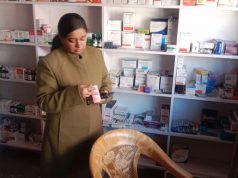‘Exploring Cannabis in India’: Karan Madhok in Conversation with Yauvanika Chopra
By Arun Pratap Singh
Garhwal Post Bureau
Dehradun, 26 Oct: At the Valley of Words Literature & Arts Festival 2025, author Karan Madhok engaged in a thought-provoking discussion, titled ‘Ananda: An Exploration of Cannabis in India’, moderated by Yauvanika Chopra. The session examined India’s multifaceted and even paradoxical relationship with cannabis, delving into its cultural, spiritual, medicinal, and legal dimensions.
Chopra asked searching questions regarding the book and also about his journey across the country to explore the paradox related to cannabis in India. In response, Madhok shared insights from his journey across eleven Indian states, exploring the diverse uses and perceptions of cannabis. From the renowned Malana Cream in Himachal Pradesh to the spiritual traditions of Kerala, he highlighted the plant’s deep-rooted presence in Indian society.
Madhok also said that, in certain parts of India, particularly towards the North and in Northern Eastern states like Manipur, a restricted use of Marijuana is accepted by the people as well as by the administration. Reminding the audience that he hails from Varanasi, though he has been brought up in Mussoorie, he said that in Varanasi the use of Bhang is legal at licensed outlets as it is linked to spirituality related to Shaivite traditions. But, in the South, possessing even a small quantity of marijuana can lead to long time in prisons. He however pointed out that while smaller peddlers and the farmers face the legal trauma, the top mafia in control of the illegal trade of marijuana often manages to get away scot-free.
Madhok emphasised how cannabis has been simultaneously celebrated in rituals and stigmatised under law. He traced its historical and spiritual significance, noting that substances like bhang have long played a role in religious festivals and practices, especially within Shaivite traditions, while also pointing out the tension created by criminalisation under the Narcotic Drugs and Psychotropic Substances (NDPS) Act of 1985.
During the discussion, Yauvanika Chopra posed probing questions on the paradoxical nature of cannabis use in India. She asked how the NDPS Act criminalises cultivation and possession of cannabis while, in many regions, it remains integral to daily life, religious rituals, and traditional medicine. Madhok acknowledged the contradiction, explaining that while some states continue to permit or tolerate ritual and cultural use, others strictly enforce prohibitions, creating a confusing legal and social landscape. He highlighted that such inconsistencies often penalise traditional farmers and practitioners who have historically managed cannabis cultivation responsibly, yet the law treats them as criminals.
Chopra also questioned the medicinal potential of cannabis and the barriers posed by its legal status. Madhok recounted instances when people have used cannabis therapeutically for pain management, anxiety relief, and other health conditions. However, he stressed that restrictive regulations under the NDPS Act hinder research, scientific inquiry, and medical use. He argued that India’s legal framework has not kept pace with evolving understanding of the plant, leaving patients, researchers, and traditional practitioners in a precarious position.
Madhok felt that a more nuanced and informed approach is needed. He however did not agree to a suggestion by the audience that use of marijuana can result in greater creativity. He also reminded about non-narcotic uses of marijuana plant which grows fairly commonly in the country and particularly in the hills where it is not that kind of taboo as it is elsewhere in the country. He suggested that revisiting India’s historical and cultural knowledge about cannabis, while integrating modern scientific insights, could provide a balanced pathway for policy and practice. However, he also admitted that unrestricted or unregulated use of cannabis can lead to complications but added that its illegality often results in the people experimenting also with brown sugar as the peddlers and the dealers are same people.








